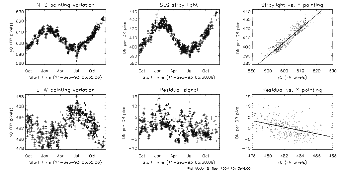
 |
Documentation > SXT Observation Notes > this page |
Image name: Straylight_and_Pointing.png (click image to enlarge)
Image size: 21.8500 KB (1024x512)
Date submitted: 08-Dec-1994

CORRELATION OF SXT STRAY LIGHT WITH SUN CENTER POSITION
This analysis was done with stray light data collected in the routine
SLS images which have been obtained since the last Yohkoh pointing
change. The units refer to the signal in the upper half of the SLS
image where the optical signal is about 75% of the total signal. This
25% dark signal has not been removed for this analysis. These data are
taken from the upper (high signal) one of the two parallel SLS curves.
The the other shutter position which gives the lower curve gives
essentially equivalent results.
The strong correlation with N-S pointing is evident. After correcting
for this with the straight line fit the residual correlation with E-W
pointing is much weaker. Note that these data are taken with the
shutter closed and the narrow band optical filter in place so pinholes,
etc. are not involved. Thus, these data are more characteristic of the
size of the hole in the entrance filter and overall stability of the CCD
response, etc. It appears that the leak is quite stable over this time
period. The residual scatter includes effects of variations in CCD dark
signal and the fact that there are really 4 shutter parking positions
rather than just 2.
The usefulness of this analysis for the problem of correcting for stray
light in the x-ray images lies in the knowledge that the magnitude of
the straylight leak is stable to better than a percent. The stability
of the CCD and NB filter response proves beyond doubt that the decrease
in SXT aspect sensor signal was caused by changes in the front end
optics.
Offpoint data have been excluded from this analysis but may be included
later to see how far this linear relationship can be extended.
L. Acton 12/08/94